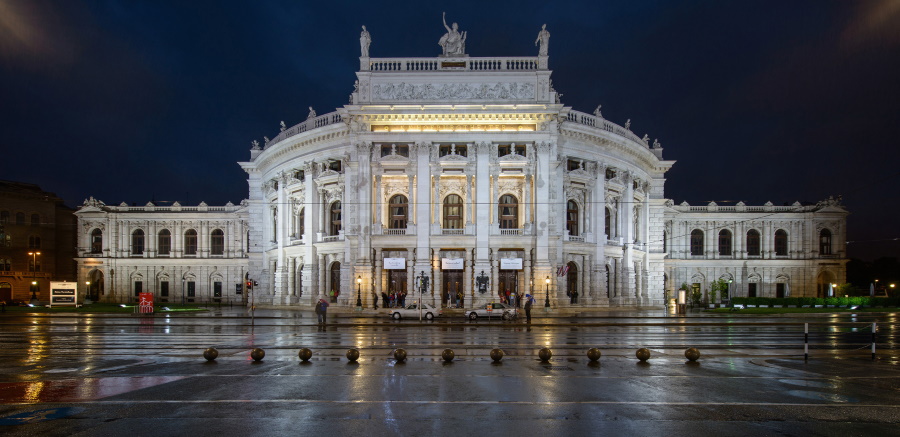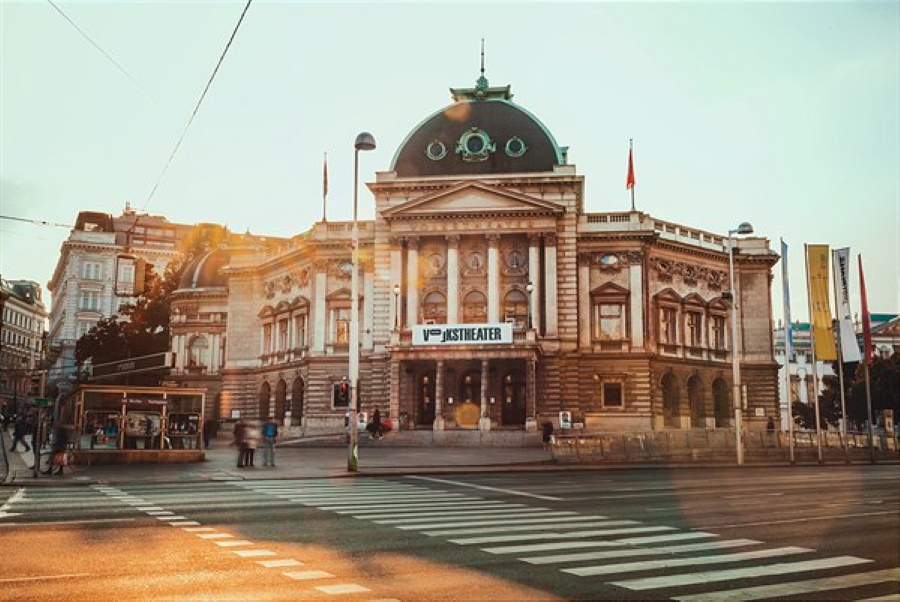“Adieu to you all!”
The man and the woman bade farewell to a stage of empty seats bordered by black doors at the end of Eugène Ionesco’s seldom-produced 1952 farce The Chairs. The couple, seemingly the happiest they’d ever been, retreated from view, only to take their own lives, falling out of open windows into pools of water below. On came “the speaker,” the rumored star of the evening, possessor of the meaning of life, who turned out to be a non-speaking Deaf person. Sounds of people laughing, murmuring, hushing one another, and coughing were piped from speakers into Vienna’s Akademietheater, one space in the city’s flagship Burgtheater. Slowly, the curtain fell, bringing to an end not only this most absurd play but also the Austrian capital’s 2018-19 theatrical season.
It is August and Vienna’s great theatres lay dormant. In the summer—a time when no small part of Vienna’s population has left for summer vacations or languorous months spent living out in the country—the best stage work is to be found in Austria’s provinces, where cities like Salzburg and Bregenz play host to sold-out summer festivals that typically mix opera, classical music, and straight plays, works old and new, the most prestigious version of summer stock it is possible to imagine.
But don’t be fooled by the city’s relative quiet. Though a welcome respite after a period of churn and flux, it presages a time of further change, as the city’s two biggest theatres, Burgtheater and Volkstheater, welcome new leaders, both with new visions for their storied companies. In the last few months, as these great Viennese houses have either struggled to find new directors or redefine their identity and raison d’être, every decision has been subject to intense scrutiny in the press. The fate of the Volkstheater in particular has become a political football, bringing all those concerned back to the question of what is the right and proper role of a publicly funded theatre.

Still, the undeniable focal point for city’s theatre remains the Burgtheater. Established in 1741 by the Habsburg royal family and known simply to the Viennese as the Burg, it moved to its current home on the city’s Ringstrasse in 1888. A repertory theatre that focuses exclusively on plays by both Austrian and international authors from Shakespeare to Ayad Akhtar, and home to a permanent ensemble of 71 actors, the Burgtheater is one of the two or three most prestigious playhouses in the German-speaking world. To be its director is considered the pinnacle of any theatre career and is a highly sought-after posting.
The Burgtheater, and indeed Viennese culture in general, has long had conservative tendencies. But Claus Peymann, who commanded the Burg from 1986 until 1999, led the drive to bring a kind of contemporary relevance to Viennese theatre, opening it up to new ideas, playwrights, and directors. That the Burgtheater remains something to be talked about is in no small part because of Peymann, who, beginning in the 1970s, when he first began to mount productions there, brought great new Austrian writers like Thomas Bernhard, Peter Handke, and 2004 Nobel winner Elfriede Jelinek to the Burg’s sometimes stuffy, subscription-based audience.
To understand the centrality of the theatre to Viennese life, one only has to look at the controversy that erupted when Peymann directed the premiere of Bernhard’s masterwork for the stage, 1988’s Heldenplatz, about a Jewish university professor who returns to Vienna after the war and, finding the city as anti-Semitic as ever, commits suicide. Fueled by select quotations from the playscript that were leaked to the populist press, the play—which also called Austrians a nation of idiots in search of a director—was the subject of furious and often ill-informed debate. Politicians climbed over each other to condemn the play, while protestors dumped manure in front of the theatre. On opening night the work received a 45-minute standing ovation, punctured by booing and yelling from far-right activists sitting in the balcony.
Though central, the Burg is far from the only important theatre in Vienna. The Volkstheater, opened in 1889, is, as the name would suggest, a theatre for the Volk, the people—in ostensible contrast to the Burgtheater, established by and for the royal family and the aristocracy. Like other Viennese theatres, it receives financial support from the Austrian federal government and the City of Vienna, but as a theatre with a social-democratic political background, it is also sponsored and propped up by the Chamber of Labour, a body representing the interests of the roughly three million full- and part-time employed persons working in Austria today. Its programming can be said to be more eclectic than that of the Burg, in recent years producing the works of Tennessee Williams and David Lindsay-Abaire in translation alongside the David Bowie musical Lazarus.
The Theater in der Josefstadt, meanwhile, is the oldest and smallest of the main houses (around 600 seats), and is distinguished by a fantastically loyal and largely middle-class audience of subscribers, having the character of a local neighborhood theatre set within a larger city. Its output is closer in character to that of the Burg than the Volkstheater, mixing classic Austrian writers like Johann Nestroy and Arthur Schnitzler with standout contemporary authors like Daniel Kehlmann. Kehlmann’s most recent work, Die Reise der Verlorenen (The Voyage of the Damned), about the doomed fate of the MS St. Louis and its Jewish refugee passengers, premiered at the Josefstadt last year.
Add in the city’s opera houses and musical theatre venues, and it is clear that, as Karin Bergmann, the outgoing director of the Burgtheater, recently remarked, the Viennese have an enormous attachment, even addiction to theatre. Nowhere is the work of actors, directors, and set designers so closely scrutinized as it is here, she said. When Bernhard sought to describe Austria, he could only do so in theatrical terms. “Austrians believe that their country is a tragedy, when it is in fact a comedy,” he once wrote, adding that no play in the world can compare to the comedy that is the Austrian Republic.
The aforementioned performance of The Chairs also marked the end of Bergmann’s five-year tenure at the Burg, and the theatre’s uncertain future direction has been part of the gossip, the Sturm und Drang, around Vienna’s theatres in recent months. The first woman to run the Burgtheater, Bergmann—who was Peymann’s assistant director—had a largely successful tenure, leading the Burg out of a terrible financial scandal that brought down her predecessor, Matthias Hartmann, and back to profitability, with almost two million people having visited the Burg in her time as director.

But Bergmann was also criticized for being artistically unimaginative, for preferring safer bets to more avant-garde works, in productions that relied too much on simplistic and rather cheap sets, and for having worked with too few female writers and directors. (Between 2014 and 2019, 79 male directors staged productions at the Burg compared to 28 female ones.) The first charge, at least, could not be slapped on her successor, Martin Kušej, who begins work on Sept. 12 and is looking to take the Burg in an altogether different direction, one that will be younger and more international, including fresh German-language productions of Who’s Afraid of Virginia Woolf? and Noises Off as well as new works by the Lebanese-Canadian playwright Wajdi Mouawad.
But as much as the Viennese love to gossip about the Burg, the real point of interest has been the future of the city’s ugly duckling, the Volkstheater. For years this cavernous and unloved place, in desperate need of renovation, has been a theatre in search of an identity, drifting from season to season like a listing ship. Its current director, Anna Badora, having tried everything else, sought to make its 2018-19 program its “season of democracy”—not that anyone seemed to notice. While the Burgtheater was playing to a respectable 77 percent capacity and the Joseftstadt an astonishing 88 percent, the Volkstheater languished at a measly and unsustainable 56 percent. Similarly, though the Burgtheater receives an annual $52.7 million from the public purse and Josefstadt $15.8 million, the Volkstheater is left to feed on $13.8 million.
With Badora’s contract up in 2020, the City of Vienna searched for months for a successor. The problem was, no one could seem to agree on what to do with the Volkstheater, or what exactly the role of this particularly publicly funded theatre should be. It was in part a debate over whether the theatre should stick to the traditional ensemble-and-repertory model or become a co-producer that simply plays host to external productions which need not play in rep. The latter brings with it higher rewards but greater financial risks.
Another question was whether this bastion of social democracy, this people’s theatre backed by the Chamber of Labour and the trade union movement, should have a political mission. One particularly provocative column in the center-right daily Die Presse simply suggested doing away with the Volkstheater altogether and turning it into a swimming pool.

Eventually, however, the city did find its man in the form of Kay Voges, who will arrive in Austria in the fall of 2020 having led the Schauspiel in Dortmund, Germany, since 2010. Voges’s stated mission: to make the Volkstheater the most progressive and avant-garde theatre in Vienna, one fit for the digital age, with a focus on the quality of its own productions rather than on attracting outside works. How such ideas will actually translate into a program of work—and how Voges plans to carve out an identity for the Volkstheater as distinct as that of the Burg—the city will have to wait till next year to find out.
But it is only a month until the curtain goes up on Kušej’s new Burg, beginning with Euripides’s The Bacchae. Aside from making the theatre’s profile younger and more international, a hub of European authors and languages, Kušej has said that he would also like for his publicly backed theatre to be a “haven” for political opposition in Austria, as it was during not only the Peymann era but also in the early 2000s, when the far-right Freedom Party was part of Austria’s government. The role of the theatre, Kušej reasons, is to ask questions and present different perspectives. The idea is not only to challenge the powers that be but the Burg’s audiences too.
As Vienna bids adieu to one theatrical season, the coming of the next looks set to bring with it a whole new round of debates, disputes, and disagreements. Here’s hoping that what’s onstage is as rich as the drama behind the scenes.
Liam Hoare is European editor for Moment magazine.


